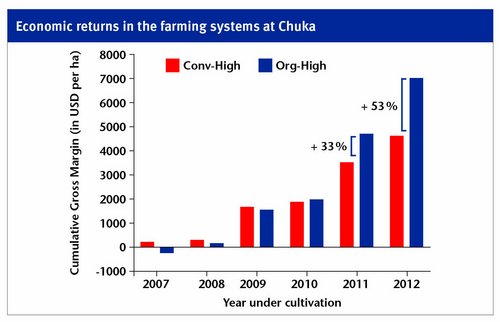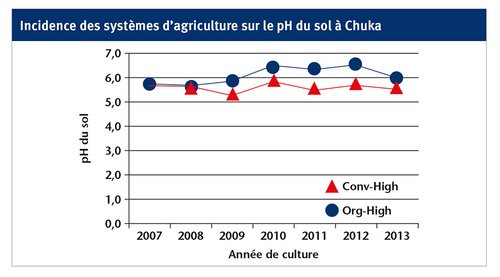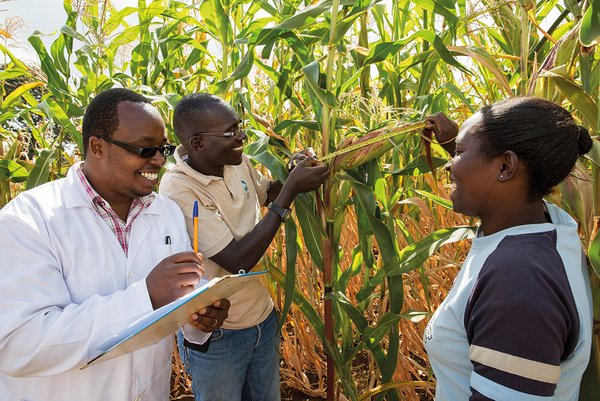 Download this article in magazine layout
Download this article in magazine layout
- Share this article
- Subscribe to our newsletter
Organic equals conventional
About 80 per cent of Africa’s population depend on agriculture as their primary source of livelihood, and it provides employment to around 70 per cent of the continent’s poorest people. The main form of farming in sub-Saharan Africa (SSA) is simultaneous multispecies mixed farming. In East and Southern Africa, maize-based mixed farming is the most important food production system, but productivity is very low and is considered one of the reasons for the persistence of rural poverty in the region. The low crop productivity has been attributed to a number of factors that include low soil fertility and long-term soil degradation caused by deforestation, overgrazing, continuous and intensified cropping with inadequate replenishing of soil nutrients and a low take up of sustainable resource management strategies. There is a clear need to reverse the decline in soil fertility and the degradation of the natural resources.
The positive impacts of organic agriculture on soil fertility and biodiversity, but also on productivity and profitability, plant health, resource use efficiency and climate change mitigation, have already been established in temperate environments. However, these facts are yet to be proven under tropical conditions. This is what the Farming Systems Comparison (SysCom) was launched for. It aims to fill the present knowledge gap by evaluating the performance of different farming systems over a long term. Following six years of trial crops, the first results are now on hand.
The field trials
In the context of the study, in 2007, permanent field sites were established at two locations in the Central Highlands of Kenya with a sub-humid environment – Thika and Chuka. These field trials feature a 6-season-3-year crop rotation with maize and different vegetables and are set up in a way that both organic and conventional farming systems are comparable at high and low input levels, representing commercial scale irrigated and subsistence scale rain-fed farming respectively. In principle, the level of inputs in the low-input treatments reflects the availability of farm-owned resources as a determining factor, whereas in the case of the high-input treatments the crop requirements and profitability are the main driving factors, necessitating the use of market-purchased inputs (e.g. biopesticides for organic) and irrigation water. Thereby, both the field experiments are designed to compare four treatments: Conventional High Input (Conv-High), Organic High Input (Org-High), Conventional Low Input (Conv-Low) and Organic Low Input (Org-Low).
Project achievements and findings till date
The first six-years results of the long-term study show the potential of organic farming to improve the soil fertility and economic profitability compared to the conventional approach (see diagrams below).


Here are the examined factors in detail:
Productivity and profitability
- In high-input systems, yields of organic are equal to those in the conventional approach. The yields of grain maize and baby corn are similar at both sites in all years except in year one at Thika.
- Low-input organic systems showed that the yields of maize intercropped with beans in organic were similar to those of the conventional one, while under maize sole cropping at Thika, yields were 1.7 to 3.2 times lower in organic compared to conventional.
- The high input organic system turns out to be more profitable than the high input conventional system after the first four years. Considering the premium price of organic certified products, the gross margin was higher in organic, beginning from the fourth year on.
- Soil fertility
- High-input organic farming enhanced soil fertility by improving soil pH, potassium, calcium and magnesium compared to high-input conventional farming.
- High- or low-input organic and conventional farming systems have similar effects on soil organic carbon content.
Pests and diseases
- No significant differences were found between organic and conventional systems regarding diseases (maize streak disease, turcicum leaf blight and downey mildew).
- No significant differences were found between organic and conventional systems regarding pests (aphids and stemborer), except at Chuka in 2010, where stemborer damage was higher in the conventional system compared to the organic system, and in 2011 and 2012, where the reverse was observed.
- However, termites are constantly, and significantly more, abundant in organic systems compared to the conventional ones. Out of the total population, beneficial termites were more in organic systems whilst plant destructive termites were more in conventional systems. There was however similar damage caused by termites in both systems.
Summing up
These first results from the long-term study in Kenya show the potential of organic agriculture to improve soil fertility and farmer incomes in sub-Saharan Africa. At the same time, the yields of organic fields level off conventional fields. This shows that organic systems start to deliver substantial economic advantage over conventional systems as soon as the initial conversion phase is over.
Now it is important to observe the performance in the mid and long term. This is why it is planned to continue the SysCom programme with further studies focusing on these aspects over the next few years.
About “SysCom”
The long-term study called “SysCom” compares organic and conventional farming systems under identical conditions. The study, led by the Research Institute of Organic Agriculture (FiBL) Switzerland, is implemented in co-operation with local partners in Kenya: the International Centre of Insect Physiology & Ecology (icipe), Kenya Agricultural & Livestock Research Organization (KALRO), Kenyatta University (KU), Kenya Organic Agriculture Network (KOAN), Kenya Institute of Organic Farming (KIOF) and the Tropical Soil Biology and Fertility Institute of CIAT (TSBF-CIAT). The study is funded by Biovision, Swiss Agency for Development and Cooperation, Liechtenstein Development Service and the Coop Sustainability Fund. For further information, see: www.systems-comparison.fibl.org
Noah Adamtey
Project Coordinator
Research Institute of Organic
Agriculture (FiBL)
Frick, Switzerland
noah.adamtey@fibl.org





Add a comment
Be the First to Comment